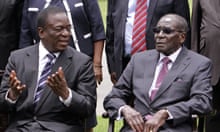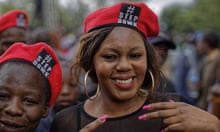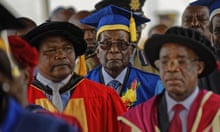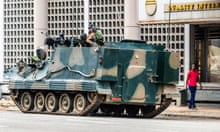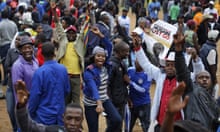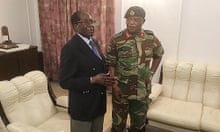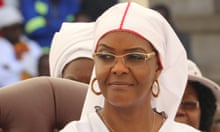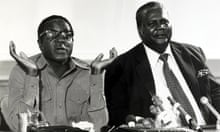The military in Zimbabwe says it has temporarily taken control of the country to “target criminals” around the president, Robert Mugabe, amid high tension and reports of explosions in Harare.
Soldiers have sealed access to parliament, government offices and courts in the capital, residents said. Access to the president’s official residence was also blocked by troops.
A military spokesman, Maj Gen SB Moyo made an announcement on state television early on Wednesday saying Mugabe and his family were “safe and sound and their security is guaranteed”. Troops had seized the network’s offices late on Tuesday night.
Moyo said the army was targeting “criminals around” Mugabe, who were “committing crimes that are causing social and economic suffering in order to bring them to justice”.
The takeover comes amid a bitter battle over who will succeed 93-year-old Mugabe.
Emmerson Mnangagwa, the veteran vice-president and former spy chief who has strong support among many in Zimbabwe’s armed forces, was unceremoniously fired last week.
The move opened the road to power open to Grace Mugabe, the president’s 53-year-old wife, and a rival faction within the ruling Zanu-PF party. The finance minister, Ignatius Chombo, a member of Grace Mugabe’s G40, was reportedly among those detained by the military.
ProfileWho is Grace Mugabe and why is she controversial?
Show
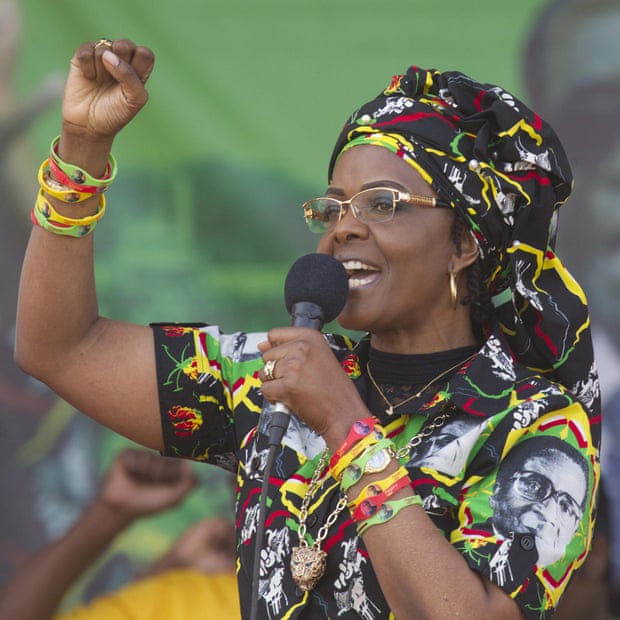
Background
Grace Mugabe is the 52-year-old first lady of Zimbabwe. Born in South Africa, she married Robert Mugabe, 40 years her senior, in 1996. Initially struggling to emerge from the shadows of the president’s popular first wife, Sally, who died in 1992, Mugabe appeared by her husband’s side for official functions but rarely got involved in politics herself, focusing publicly on her charity work while gaining a reputation for legendary shopping expeditions.
Controversies
In 2009 a British photographer alleged that she punched him repeatedly in the face when he tried to take a picture of her in Hong Kong. She has since been implicated in several incidents outside Zimbabwe: in Singapore, in Malaysia and most recently in South Africa, where she allegedly assaulted a model in August.
Political ambitions
The unveiling of Grace Mugabe as a potential successor to her husband began in 2014, when she became head of the ruling party’s women’s league and the state propaganda machine began talking up her political acumen. Before the events of 14 November her path to power had received a boost when her main rival, the vice-president , Emmerson Mnangagwa, was fired on 6 November. The feud between Mugabe and Mnangagwa had been bitter – in October she publicly denied poisoning him after he fell ill at a rally in August.
Insisting it was not a coup, Moyo said “as soon as [the armed forces] are done the situation will come to normalcy”.
“We urge you to remain calm and limit unnecessary movement. However, we encourage those who are employed and those with essential business in the city to continue their normal activities as usual,” he said.
Moyo said the army had acted because the Zimbabwe Broadcasting Corporation had been ordered not to broadcast a statement from the military on Monday and “the situation in our country has moved to another level”.
Cancelling all leave for members of the military, he urged the security forces to “cooperate for the good of our country”. He warned “any provocation will be met with an appropriate response”.
There were reports of a number of loud explosions and some incidents of members of the armed forces harassing passers-by during the night.
Residents of Harare said the city was quiet on Wednesday morning, though the usually busy streets were empty. There was no sign of any disturbance elsewhere in the country.
A witness told Agence France-Presse that gunfire had erupted near Mugabe’s private residence in the suburb of Borrowdale early on Wednesday, but there was no independent confirmation of the report.
Nelson Chamisa, the deputy head of opposition MDC party, called for “peace, constitutionalism, democratisation, the rule of law and the sanctity of human life”.
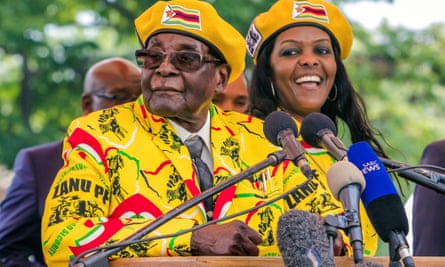
The US embassy in the capital tweeted out a message citing “ongoing uncertainty.” A statement later posted by the embassy told US citizens in Zimbabwe to “shelter in place until further notice”.
The British embassy said that due to the “uncertain political situation” British nationals should remain at home.
Military convoys had been seen driving through the capital earlier on Tuesday, sparking rumours of a coup attempt just a day after the country’s military chief – flanked by other senior officers – warned that he was prepared to “step in” to end turmoil in Zanu-PF.
Zimbabwe’s government accused the head of the armed forces of “treasonable conduct” in the early evening, ratcheting up the tension.
Mugabe, the only leader Zimbabwe has known in 37 years of independence, spent Tuesday afternoon in a cabinet meeting, but his whereabouts overnight were unknown. In its statement the military said they continued to recognise the president as commander in chief of the armed forces.
Mugabe’s sacking of Mnangagwa came as a shock to many observers.
ProfileWho is Emmerson Mnangagwa?
Show
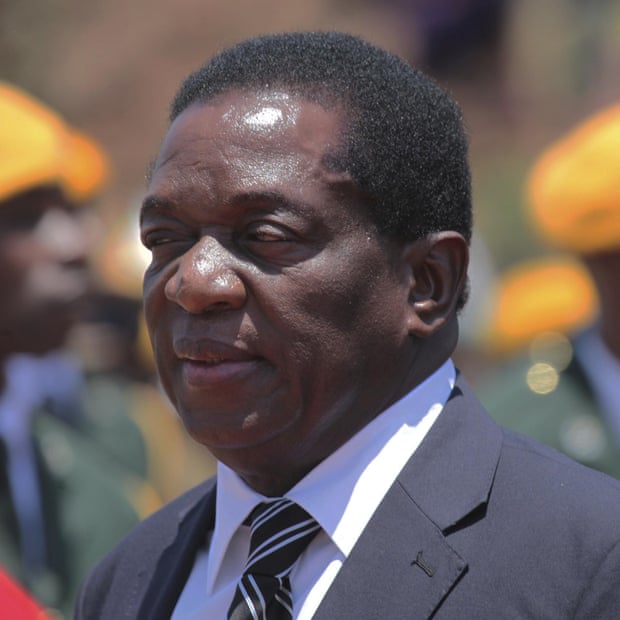
Emmerson Mnangagwa was sworn in as president of Zimbabwe on 24 November, capping a dramatic few weeks that began when he was sacked as vice-president by Robert Mugabe on 6 November.
Mnangagwa, a 75-year-old former intelligence chief, had been locked in a battle with the first lady, Grace Mugabe, to succeed her husband as president.
His sacking – an attempt to clear Grace's path to power - was a tactical error that triggered a military takeover, Mugabe's impeachment by parliament, and his resignation.
Mnangagwa has strong support within the security establishment and among veterans of Zimbabwe’s 1970s guerrilla war, when he earned the nickname “the crocodile”.
Despite allegations about his role in atrocities in the 1980s, much of the international community had long seen him as being the most likely figure in Zimbabwe to guarantee a stable transition and implement economic reforms.
Nicknamed “the crocodile” from his time fighting in the country’s liberation wars, Mnangagwa has strong support among veterans and within the security establishment that he once ran.
He had been considered the mostly likely candidate to succeed Mugabe if the president decided to step down or died in office. Mnangagwa’s sacking was widely seen as a move to pave the way for Grace Mugabe to take power instead. It caused widespread discontent among Mnangagwa’s supporters and exposed deep factional divides within Zanu-PF ranks.
On Monday, Gen Constantine Chiwenga, the head of Zimbabwe’s military, called a press conference to warn that troops could intervene if long-term political allies continued to suffer.
“We must remind those behind the current treacherous shenanigans that, when it comes to matters of protecting our revolution, the military will not hesitate to step in,” Chiwenga said in a statement read at a news conference packed with 90 senior officers from key units, in a show of military unity.

The statement was initially carried on state media, then removed from the airwaves, but the government was slow to respond, with no word from Mugabe himself.
After the cabinet meeting on Tuesday, however, a statement was issued by Simon Khaya-Moyo, the government spokesman and national secretary for information and publicity, accusing Chiwenga of “treasonable conduct”.
“Such conduct stands unreservedly condemned not only in the party ... but also in the [region] and the entire African continent where subversion of constitutional authority is ... regarded as absolute anathema,” the statement read.
Mugabe’s authoritarian rule has been anchored by support from the military but the ageing leader has systematically dismissed veterans of the liberation struggle from party posts in recent years, leaving the top echelons stacked with officials who did not fight in the independence war.
War veterans broke ranks with him in 2016 and have vowed to form a broad front with the opposition to challenge his rule.
Chris Mutsvangwa, the head of the war veterans’ group, told reporters in Johannesburg last week that Grace Mugabe was “a mad woman” who had won power through a “coup ... by marriage certificate”.
Mutsvangwa issued a statement from Johannesburg on Wednesday praising the military for carrying out “a bloodless correction of gross abuse of power” that would return Zimbabwe to “genuine democracy.”
Grace Mugabe is a deeply divisive figure in Zimbabwe with limited popular support. She has been tarnished by an alleged assault against a model she had found with her sons in a luxury apartment in Johannesburg in September. Granted diplomatic immunity after the incident, she was allowed to leave South Africa despite a police inquiry, and denies any wrongdoing.
Reports of extravagant purchases, including property in South Africa and a Rolls-Royce, have also angered many Zimbabweans. Pictures of one of the first lady’s sons apparently pouring most of a bottle of champagne over a luxury watch worth tens of thousands of dollars in a nightclub were shared widely on social media this week.
The crisis comes at a time when Zimbabwe faces severe economic problems. The country is struggling to pay for imports due to a shortage of dollars, which has also caused acute cash shortages.

